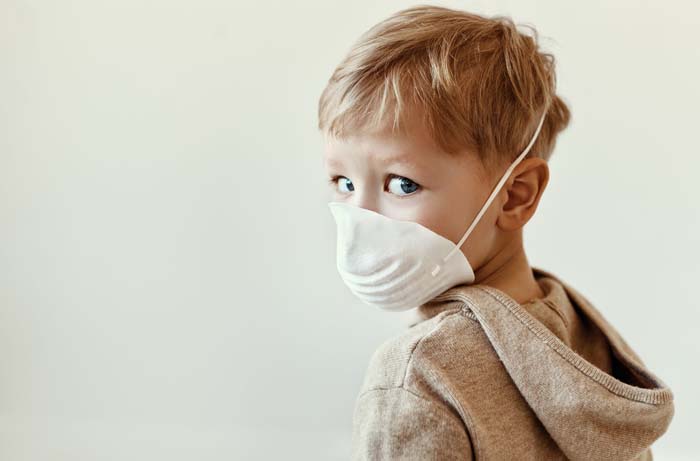It’s hard to be human these days—It’s ten times harder being a parent. And, it’s probably infinitely harder to be a child living through the coronavirus pandemic. While we try to make sense of this upside-down world and we adjust to the unsettling new reality of school closures, work-from-home directives, and stay-at-home orders, our children are sitting there unable to cope with it all on their own.

Their brains are just not developed enough for them to handle all the changes and stress caused by this health crisis all by themselves.
Everything they knew, loved and did is no longer as they remember. Routine—which kids adore—has vanished. Instead of preparing for a new day in school, their days probably start with worrisome updates on the Covid-19 situation. Instead of visiting friends and family, they’re now isolating themselves while living with the fear that people are getting sick. And instead of the mum and dad they used to know, they’re seeing stressed-out and less-communicative shells of their parents.
Summer plans are gone, best pals are unreachable, classes are suspended, and the world keeps changing from one day to the next. So, how do we tell our children the right coronavirus story, and how do we build strength and resilience in these uncertain times? A crisis like this and the way we respond to it will shape the adults our kids will become.
Be honest and talk about it
This situation is not something you should keep from your children, even if they are young. Your fears and emotions will reach them, even if you try to put on a happy face. They just feel them. And there are few things worse than telling your kid everything is OK when they can
sense that it’s not. Because right at this moment, you are shaping a future adult will not know how to talk about their true feelings. And why would they even want to, if all they have learnt from their folks is that they should hide them? Children can easily detect emotions from non-verbal cues, and they have a greater capacity than adults to internalise the feelings of others.
If the parent is stressed, overwhelmed, anxious, or angry—even if they try to not talk about it— the child will perceive this emotional cocktail and consume it to the very last drop, even if they don’t want to. Be honest and explain what is happening in a way that they can understand, no matter their age. Children are very perceptive and will model how to respond to situations from their carers. Speak about what is going on and what your fears are. Don’t worry about letting your children see you vulnerable as, ironically, this will make them stronger. And even if our stress levels are high, we must not forget to choose patience and give our children loving responses in order to build resilience in them. This will help them go on to develop their strengths and abilities over time.
Listen to your kids’ stories and worries
After having this talk with your kids, you need to listen. Encourage your children to share their feelings about what an unprecedented time this is for all of us. They face an enormous disruption to their lives, so they are likely experiencing worry, anxiety, and fear. These fears may include ones that are very similar to those experienced by adults, such as the fear of dying, the fear of their relatives dying, or the fear of needing medical treatment. Little ones might not be able to name their fears exactly, but if you pay attention to their stories or their games, you will clearly see the things that have been scaring them these days.
My daughter, who is only three years old, plays this game where she builds a zoo and organizes classes for animals to teach them how to beat the coronavirus. She also feeds them magic food that gives them superpowers. Then, she opens the zoo gate and says: “Now go and save the world from the bad virus, especially mom, dad, my sister, and our dog!” In her story, we’ve got this; we will beat the coronavirus. But the fear is there. If you sense this fear in your own kids, help them express it.
Cope with difficult emotions together (and have fun doing it)
Now that you have all talked openly about your fears and emotions, it’s time to find ways to manage them together. Doing this could also end up being a way to create special, fun, loving memories with your children, which will last a lifetime and will help them cope with the even more difficult situations they may come across in the years to come.
Invent a special pandemic routine, break the rules with a little extra TV time or staying up late past bedtime to tell stories, dance and cook together like you never did before, or do some exercise together through an online programme. Communicate your love to your children and tell them some of the things you appreciate about them. What truly makes them come out stronger from this situation is the feeling that no matter what happens, no matter what may come, they can always count on you. The way you respond to this crisis will mirror the way they respond to their future crises. When they see love and acceptance on their parents’ faces, they will instantly believe that they are safe, even when things are hard. And that’s the perfect basis for them to build themselves.
Maybe we should try to look at this time as an amazing opportunity to get closer when we are told to physically stay apart—to get closer to our children. And even though nothing in our lives seems certain anymore, we can invest in one of the surest things we know: if we are there for our kids in a loving, honest, and dedicated way (as hard as it may be) we will help them build the strongest versions of themselves.
It will be like feeding them a type of “magic food” for their future, just as my daughter does with her zoo animals when gearing them up to fight against the coronavirus. Then, like her, we will open the proverbial gates and release our children into the world, saying: “Now go and save the world, strong ones!”
I prefer commas to be added before conjunctions, i.e, the Oxford comma. It’s more of a stylistic choice than anything.



